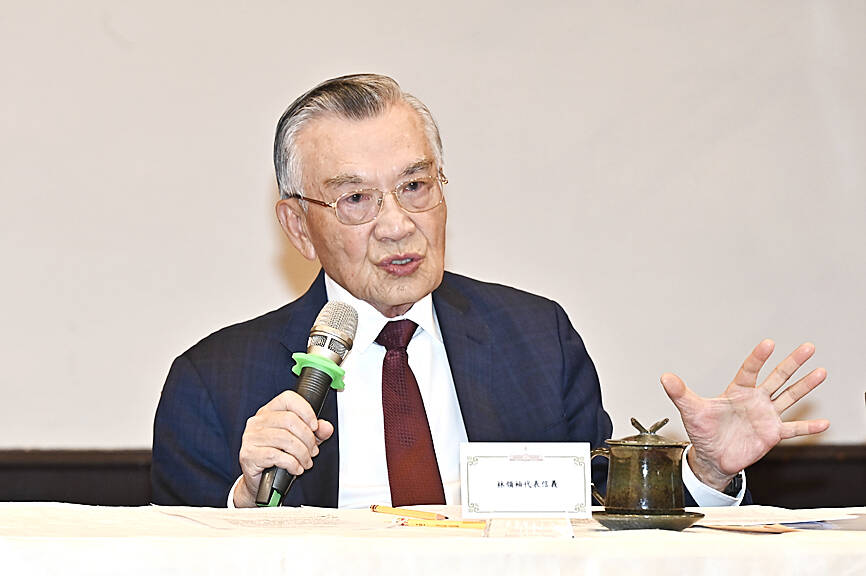Taiwan’s “visibility” at the APEC summit improved this year, with many member economies seeking cooperation with the nation in several advanced technology fields, said presidential adviser Lin Hsin-yi (林信義), Taiwan’s envoy to this year’s APEC Economic Leaders’ Meeting.
“Compared with the past, when Taiwan needed to invest far more effort to attract foreign investment and cooperation, many economies now approach us without much prompting,” Lin told a news conference yesterday.
“When the flower blooms, the butterfly comes naturally,” Lin said, adding that he held “constructive exchanges” with many leaders and delegation members, who expressed willingness to cooperate with Taiwan in semiconductors, information and communications technology, medical technology, and small and medium-sized enterprises development.

Photo: Tu Chien-rong, Taipei Times
“These interactions not only enhanced Taiwan’s visibility, but also laid a solid foundation for future substantive economic and trade cooperation,” he said.
Lin represented President William Lai (賴清德) at this year’s APEC Leaders’ Meeting in South Korea, which concluded on Saturday.
Although Taiwan is a full APEC member, its president cannot attend the meeting — due to Chinese objections and political pressure — and appoints a special envoy to go in their place.
This year’s APEC discussions focused on technological innovation, supply chain security and artificial intelligence (AI), with South Korea highlighting AI and demographic changes, Lin said.
The international economic order is facing uncertainty due to geopolitical changes, supply chain restructuring, technological transformation and climate change, he said.
Lai instructed the delegation to emphasize three key themes to the international community, Lin said.
First, Taiwan is committed to bolstering economic resilience and promoting regional economic development.
Second, the nation is willing to share its experience in leading industries.
Third, Taiwan is accelerating efforts to promote people-centered AI development.
The nation continues to promote AI applications across industries through public-private cooperation, Lin said, adding that he highlighted some examples at the meeting.
In other news, the National Security Bureau yesterday said in a meeting at the legislature’s Foreign and National Affairs Committee that US President Donald Trump’s tour of Asia would benefit Taiwan.
The establishment of a cooperative network among Indo-Pacific nations would help the region stand up against China’s economic coercion, and bolster the economic resilience and security of Taiwan’s democratic allies, it said.
The US’ cooperation with regional partners in key industries would help Taiwan leverage its advantages and experience as a global leader in semiconductor manufacturing to work with like-minded nations and develop a democratic supply chain for an emerging technology ecosystem, the bureau said.
Moreover, the expanded US-Japan alliance framework to include regional partners would help curb China’s attempts to undermine regional peace and stability, and the “status quo” in the Indo-Pacific region, it said.
Trump and Chinese President Xi Jinping’s (習近平) meeting on Thursday last week marked a new stage in US-China relations, although strategic mistrust remains between Washington and Beijing, as issues such as security and technological competition remain difficult to resolve, the bureau said.
Both sides are seeking to bolster self-reliance in key technologies and critical materials to reduce mutual dependence, it added.
The US remains concerned about China’s military activity and coercive behavior in the Taiwan Strait and the South China Sea, as it seeks to ensure that US allies in the Indo-Pacific region are capable of defending their own interests, it said.
Additional reporting by Hollie Younger

Three Taiwanese airlines have prohibited passengers from packing Bluetooth earbuds and their charger cases in checked luggage. EVA Air and Uni Air said that Bluetooth earbuds and charger cases are categorized as portable electronic devices, which should be switched off if they are placed in checked luggage based on international aviation safety regulations. They must not be in standby or sleep mode. However, as charging would continue when earbuds are placed in the charger cases, which would contravene international aviation regulations, their cases must be carried as hand luggage, they said. Tigerair Taiwan said that earbud charger cases are equipped

Foreign travelers entering Taiwan on a short layover via Taiwan Taoyuan International Airport are receiving NT$600 gift vouchers from yesterday, the Tourism Administration said, adding that it hopes the incentive would boost tourism consumption at the airport. The program, which allows travelers holding non-Taiwan passports who enter the country during a layover of up to 24 hours to claim a voucher, aims to promote attractions at the airport, the agency said in a statement on Friday. To participate, travelers must sign up on the campaign Web site, the agency said. They can then present their passport and boarding pass for their connecting international

Temperatures in northern Taiwan are forecast to reach as high as 30°C today, as an ongoing northeasterly seasonal wind system weakens, the Central Weather Administration (CWA) said. CWA forecaster Tseng Chao-cheng (曾昭誠) said yesterday that with the seasonal wind system weakening, warmer easterly winds would boost the temperature today. Daytime temperatures in northern Taiwan and Yilan County are expected to range from 28°C to 30°C today, up about 3°C from yesterday, Tseng said. According to the CWA, temperature highs in central and southern Taiwan could stay stable. However, the weather is expected to turn cooler starting tonight as the northeasterly wind system strengthens again

Taiwan sweltered through its hottest October on record, the Central Weather Administration (CWA) said yesterday, the latest in a string of global temperature records. The main island endured its highest average temperature since 1950, CWA forecaster Liu Pei-teng said. Temperatures the world over have soared in recent years as human-induced climate change contributes to ever more erratic weather patterns. Taiwan’s average temperature was 27.381°C as of Thursday, Liu said. Liu said the average could slip 0.1°C by the end of yesterday, but it would still be higher than the previous record of 27.009°C in 2016. "The temperature only started lowering around Oct. 18 or 19